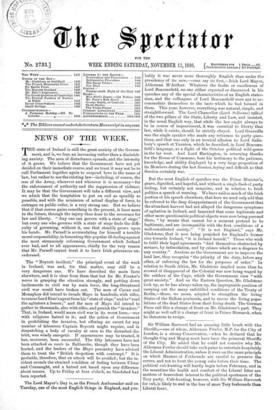The " Boycott incident," the principal event of the week
in Ireland, was and, for that matter, may still be a very dangerous one. We have described the main facts- elsewhere, and it is clear from them that but for Mr. Forster's nerve in grasping the situation strongly, and putting down incitements to civil war by main force, the long-threatened civil war would have broken out. The men of Cavan and Monaghan did intend to invade Mayo in hundreds, with rifles, to rescue Lord Erne's agent from his " state of siege," and to " read the agitators a lesson ;" and the men of Mayo did intend to gather in thousands, also with rifles, and punish the " invaders." That, in Ireland, would mean civil war in its worst form,—war with religions hatred in it; and the action of Government in prohibiting the invasion, but offering an escort for any number of labourers Captain Boycott might require, and in despatching a body of cavalry at once to the disturbed dis- trict, was wisely energetic. If appearances may be trusted, it has, moreover, been successful. The fifty labourers have not been attacked en route to Ballinrobe, though they have been booted, and the leaders of the Mayo peasantry have advised them to treat the " British despotism with contempt." It is probable, therefore, that an attack will be avoided ; but the in- cident reveals the strained condition of feeling between Ulster and Connaught, and a hatred not based upon any difference about tenure. Up to Friday at four o'clock, no bloodshed had been reported.


































